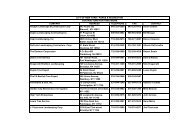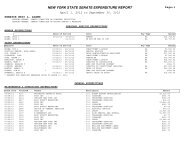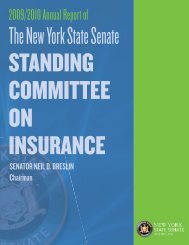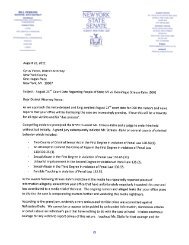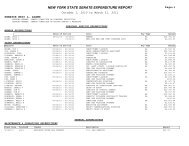Crime Committee Report e.indd - New York State Senate
Crime Committee Report e.indd - New York State Senate
Crime Committee Report e.indd - New York State Senate
Create successful ePaper yourself
Turn your PDF publications into a flip-book with our unique Google optimized e-Paper software.
S.124 SAMPSON, DIAZ, HASSELL-THOMPSON<br />
Domestic Violence and Destruction of Marital Property<br />
This law corrects the holding in People v. Person, 658 N.Y.S.2d .372 (2nd Dep’t 1997) that<br />
a husband cannot be charged with criminal mischief when he destroys the personal property<br />
of his estranged wife because the property was marital property in which the husband had a<br />
proprietary interest. In that case, Mr. Person forcibly entered Ms. Person’s dwelling, assaulted<br />
her, and destroyed her clothing, toiletries, the contents of her handbag, and various items of<br />
household furnishings. Although convicted of criminal mischief in the fourth degree at the<br />
trial level, the Appellate Division reversed, holding that “because the defendant had an equitable<br />
interest in the items he was charged with damaging or stealing... he could not be charged<br />
with these crimes.” The Person case misapplies the Domestic Relations Law, which defines<br />
marital property for purposes of equitable distribution, to a domestic violence crime under the<br />
Penal Law. As the <strong>New</strong> <strong>York</strong> <strong>State</strong> Commission on Domestic Violence Fatalities stated in its 1997<br />
report to the Governor: “The court in Person appears to have equated marital property for<br />
purposes of distribution between the parties Upon divorce, with household property in which a<br />
spouse has at least a proprietary interest. The explanatory comment published with the Criminal<br />
Mischief sections of the Penal Law states: ‘Property is that of another person...if anyone,<br />
other than the defendant, has a possessory or proprietary interest in such tangible property.<br />
The Commission recommended legislation to clarify that the criminal mischief sections of the<br />
Penal Law do apply when a person destroys marital or jointly owned property, committing a<br />
form of domestic violence. Aggressors in domestic disputes often commit domestic violence by<br />
destroying or damaging property of their victim with the intent to harass, annoy, or alarm. This<br />
type of behavior is a form of domestic violence which the Person case in effect sanctions. The<br />
case directly contradicts the strong public policy in this <strong>State</strong> of protecting the victims of domestic<br />
violence. The bill implements this policy by amending each count of criminal mischief<br />
to include sanctions where a person has a possessory or proprietary interest with the intent to<br />
annoy, harass or alarm that other person. Lastly, the bill includes the crime of criminal mischief<br />
in the 2nd, 3rd, and 4th degree in the list of crimes that can constitute a family offense under<br />
the Criminal Procedure Law and the Family Court Act so that victims of this form of domestic<br />
violence have the option of going to Family Court for an order of protection when a person<br />
commits domestic violence by destroying property.<br />
S.137 SAMPSON, DIAZ, DILAN, HASSELL-THOMPSON<br />
Protection Against Spyware<br />
The act aims to protect the privacy of computer users by banning the dissemination of computer<br />
spyware and software without the authorization of the owner of a computer. Computer<br />
users download information from the internet without truly understanding what functions the<br />
programs will have. Many times computer users will encounter the opportunity to download a<br />
computer program from the internet that they believe will give them an innocuous program that<br />
will help them organize their lives. However, it sometimes is not known to the computer user<br />
what other functions the computer program will actually have and these seemingly harmless<br />
programs may also send information to a third party such as a marketing firm, or worse a person<br />
who wishes to commit identity theft. Key-logging computer programs record all of the keystrokes<br />
that a computer user makes while using a computer. Because many use computers for banking<br />
and credit card transactions, these programs allow for criminals to commit identity theft. Therefore,<br />
this legislation includes (but is not limited to) key-logging within the spyware ban.<br />
Standing <strong>Committee</strong> on <strong>Crime</strong> Victims, <strong>Crime</strong> and Correction | 2009-2010 <strong>Report</strong> 63



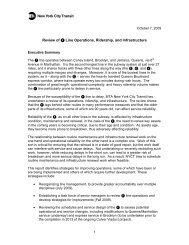


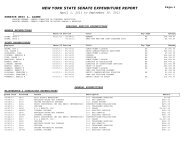
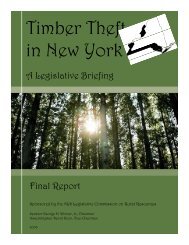

![[PDF] Proposed MTA Capital Program - New York State Senate](https://img.yumpu.com/24854139/1/190x245/pdf-proposed-mta-capital-program-new-york-state-senate.jpg?quality=85)

